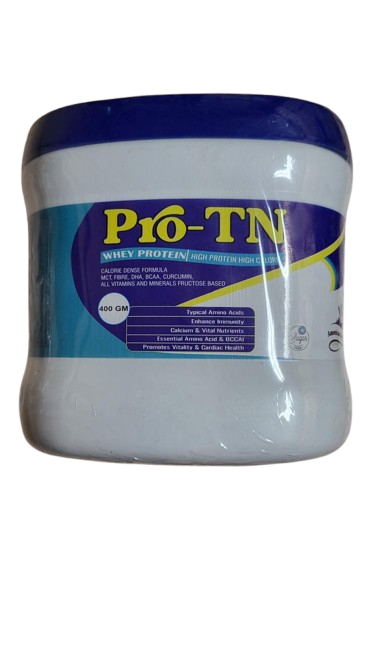
PRO-TN
Benefits of Protein, BCAAs, DHA, Vitamins, Minerals, and MCTs
Malnutrition is one of the main reasons for the cancer patients to have poor nutritional status. In addition to this, the requirement of nutritional supplementation increases when a patient experiences side effects of chemotherapy and radiotherapy i.e nausea, vomiting, changes in taste, inflammation etc.”
1. Protein
- Building Blocks: Composed of amino acids, proteins are essential for the growth, repair, and maintenance of body tissues.
- Functions: They play a crucial role in enzyme and hormone production, immune function, and as a source of energy when carbohydrates are low.
- Muscle Repair and Growth: Essential for repairing and building muscle tissue, particularly after exercise.
- Satiety and Weight Management: Increases feelings of fullness, which can help with weight control.
- Immune Support: Contributes to the production of antibodies and immune cells.
2. Branched-Chain Amino Acids (BCAAs)
- Enhanced Muscle Recovery: Reduces muscle soreness and accelerates recovery postexercise.
- Increased Exercise Performance: Helps reduce fatigue during prolonged physical activity.
- Preservation of Lean Muscle Mass: Supports muscle maintenance during caloric restriction or intense training.
- Composition: Include leucine, isoleucine, and valine.
- Functions: BCAAs support muscle protein synthesis, reduce muscle soreness and fatigue, and help maintain lean muscle mass during weight loss.
3. Docosahexaenoic Acid (DHA)
- Cognitive Function: Supports brain health, memory, and cognitive development.
- Heart Health: Reduces triglycerides and lowers the risk of heart disease.
- Inflammation Reduction: Helps manage inflammatory conditions and supports joint health.
- Type: An omega-3 fatty acid found in fish oil and algae.
- Functions: Essential for brain health, cognitive function, and fetal development. It also supports cardiovascular health by reducing inflammation and promoting heart function.
4. Vitamins
Vitamin A: Promotes healthy vision and skin, and supports the immune system, Supports vision and immune function
B Vitamins: Essential for energy metabolism, red blood cell production, and nervous system health.
Vitamin C: Acts as an antioxidant, enhances iron absorption, aids in collagen synthesis and supports skin health.
Vitamin D: Vital for calcium absorption and bone health, immune support and may improve mood.
5. Minerals
- Inorganic Nutrients: Essential for numerous bodily functions.
- Functions:
◦ Calcium: Crucial for bone health and muscle contraction.
◦ Iron: Necessary for oxygen transport in the blood.
◦ Magnesium: Involved in muscle and nerve function, as well as energy production.
◦ Zinc: Supports immune function and aids in wound healing.
6. Medium-Chain Triglycerides (MCTs)
Quick Energy Source: Rapidly metabolized for immediate energy, making them useful for athletes and those needing quick fuel.
Weight Management: May promote fat loss and reduce appetite, contributing to weight control.
Cognitive Benefits: Can enhance brain function and may be beneficial in neurodegenerative diseases.
Benefits of Zinc, Folic Acid, and Vitamin E
1. Zinc
• Immune Function: Essential for the proper functioning of immune cells, zinc helps the body fight off infections and supports overall immune health.
• Wound Healing: Plays a critical role in skin health and the healing process by aiding cell growth and repair.
• DNA Synthesis: Important for cell division and the synthesis of DNA, contributing to growth and development.
• Antioxidant Properties: Acts as an antioxidant, helping to protect cells from oxidative stress and inflammation.
• Taste and Smell: Crucial for maintaining a healthy sense of taste and smell.
2. Folic Acid (Vitamin B9)
• Cell Division and Growth: Essential for DNA synthesis and cell division, making it particularly important during periods of rapid growth, such as pregnancy and infancy.
• Red Blood Cell Formation: Helps produce healthy red blood cells, reducing the risk of anemia.
• Neural Tube Development: Critical during pregnancy for proper fetal development, especially in preventing neural tube defects.
• Heart Health: May help lower homocysteine levels, reducing the risk of cardiovascular diseases.
• Mental Health: Supports mood regulation and may help reduce the risk of depression.
3. Vitamin E
• Antioxidant Properties: Protects cells from oxidative damage by neutralizing free radicals, contributing to overall cellular health.
• Skin Health: Supports skin health by promoting wound healing and protecting against UV damage.
• Immune Function: Enhances immune response, particularly in older adults, by supporting the production of immune cells.
• Cardiovascular Health: May help reduce the risk of heart disease by preventing the oxidation of LDL cholesterol.
• Eye Health: Contributes to the prevention of age-related macular degeneration and cataracts.
Protein, BCAAs, DHA, Vitamins, Minerals, and MCTs,Zinc, Folic Acid, and Vitamin E are essential nutrients that play critical roles in various bodily functions, from immune support and cell growth to antioxidant protection and skin health. Ensuring adequate intake of these nutrients is vital for overall health and well-being. These nutrients work synergistically to support overall health, energy production, and bodily functions, emphasizing the importance of a balanced diet
